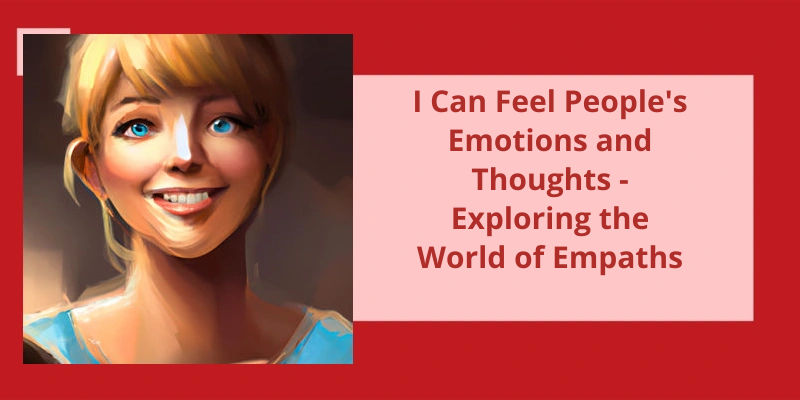As a human, we’re capable of experiencing a wide range of emotions, from happiness and excitement to anxiety and sadness. But what if I told you that there are certain individuals who possess the ability to not only feel their own emotions but also the emotions and thoughts of others around them? This extraordinary skill isn’t scientifically proven, yet many people claim to have the gift of empathy or intuition, allowing them to tap into the emotional state of those around them. While some may dismiss it as pseudoscience, others believe it to be a superpower that can prove invaluable in personal and professional relationships. So, what’s it like to walk in the shoes of an empath? How do they harness their intuition to navigate through life? In this article, we explore the fascinating world of empaths, diving deep into their minds, and uncovering the secrets behind their extraordinary abilities.
Why Can I Feel Other Peoples Emotions and Energy?
SPS is often referred to as “highly sensitive people,” and it’s when an individuals nervous system is more susceptible to external stimuli, including other peoples emotions. This means that they not only feel their own emotions more intensely but can also pick up on the emotions of others easily.
Research has demonstrated that those with SPS have an incredibly developed sense of empathy, as well as the ability to notice and react to details that others may not. This heightened awareness allows for individuals with SPS to pick up on energy and emotions that the average person may not even acknowledge.
While it’s not necessarily “absorbing” someones energy, it’s more like becoming attuned to it. Think about how we, as humans, interact with each other. We naturally pick up on each others energy, whether it’s through body language or verbal communication. It’s just part of how we connect with each other.
While SPS may seem like a curse in some situations, it’s not entirely negative. Those with SPS can use it to their advantage to become great listeners and problem solvers. Empathy and sensitivity are important qualities required in fields like therapy, counseling, and social work. Additionally, SPS can help individuals connect with others on a deeper level and understand them in a way that most people wouldnt be able to.
It’s essential to remember that being highly sensitive doesn’t mean that you need to shield yourself entirely from others emotions. It’s a matter of setting healthy boundaries and learning how to manage and regulate your own emotions. This may mean spending time alone when you need it, learning how to effectively communicate your feelings, and developing coping strategies for when things become overwhelming.
By embracing and learning how to manage this heightened sensitivity, it can be a powerful tool in building meaningful relationships and helping others in their lives.
How to Manage and Regulate Emotions as a Highly Sensitive Person
As a highly sensitive person, it can be challenging to manage and regulate emotions. However, some effective strategies include identifying your triggers, practicing mindfulness, seeking support, setting healthy boundaries, engaging in self-care activities, and utilizing calming techniques such as deep breathing and visualization. It’s also essential to recognize that emotions are a normal and healthy part of life, and it’s okay to feel and express them in a healthy way.
Empathy is a complex and intriguing phenomenon that’s puzzled scientists and laypeople alike for a long time. This ability to feel and understand the emotions of others is an important aspect of human social interaction, and is often seen as a key component of developing strong and meaningful relationships. But what does it mean when you can feel your friend’s emotions? Let’s explore this topic in more detail.
What Does It Mean When You Can Feel Your Friends Emotions?
The experience of empathy is universal, as people have been able to understand the feelings of others since the beginning of human history. However, some people are particularly skilled at this skill. These individuals are called “empaths”, meaning that they’ve an innate ability to sense other peoples emotions and feelings, often on an intense level.
When you can feel your friends emotions, you’re experiencing empathy. You may feel a physical sensation in your body, such as a tightness or pressure, that corresponds to your friends emotional state. You might also experience a strong sense of compassion or concern for your friend, as their emotional state affects you deeply.
In addition to simply sensing emotions, empathy can also involve imagining how someone else might be feeling. This is called cognitive empathy and involves the ability to put yourself in another persons shoes, so to speak. By imagining how someone else might be feeling, you can gain a greater understanding and insight into their emotional experience.
While empathy can be an incredibly powerful tool for building and maintaining relationships, it can also be a double-edged sword. Empaths often have a difficult time turning off their emotional radar and may be overwhelmed by the emotions of those around them. This can lead to emotional burnout and exhaustion, which is why it’s important for empaths to take care of themselves and establish clear emotional boundaries.
By sensing and understanding the emotions of others, we can build stronger and more meaningful relationships, while also gaining a greater understanding of the human experience as a whole. Whether you identify as an empath or simply value the experience of empathy, there’s no doubt that it plays a powerful role in shaping our emotional and social landscapes.
The Science Behind Empathy and How It Works in the Brain
- Empathy is the ability to understand and share the feelings of others
- It’s a complex process that involves several areas of the brain
- One key region is the anterior cingulate cortex, which is involved in detecting emotional salience
- Another important area is the insula, which is responsible for visceral and emotional responses
- Mirror neurons may also play a role in empathy, as they fire both when we perform an action and when we observe someone else performing the same action
- Empathy can be enhanced through practice and mindfulness
Conclusion
In conclusion, the ability to feel other people's emotions and thoughts is a unique and fascinating phenomenon that’s been debated and explored for centuries. While some believe it to be an extra-sensory gift, others consider it to be nothing more than intuition or finely-tuned observational skills. Regardless of it’s origin, this ability has the potential to greatly impact our relationships with others and provide insights into the human psyche. As we continue to learn more about this mysterious aspect of human nature, it's important to remember that empathy and understanding are critical components of healthy social interactions, and that the ability to perceive others' emotions and thoughts is a valuable tool in cultivating these qualities.






